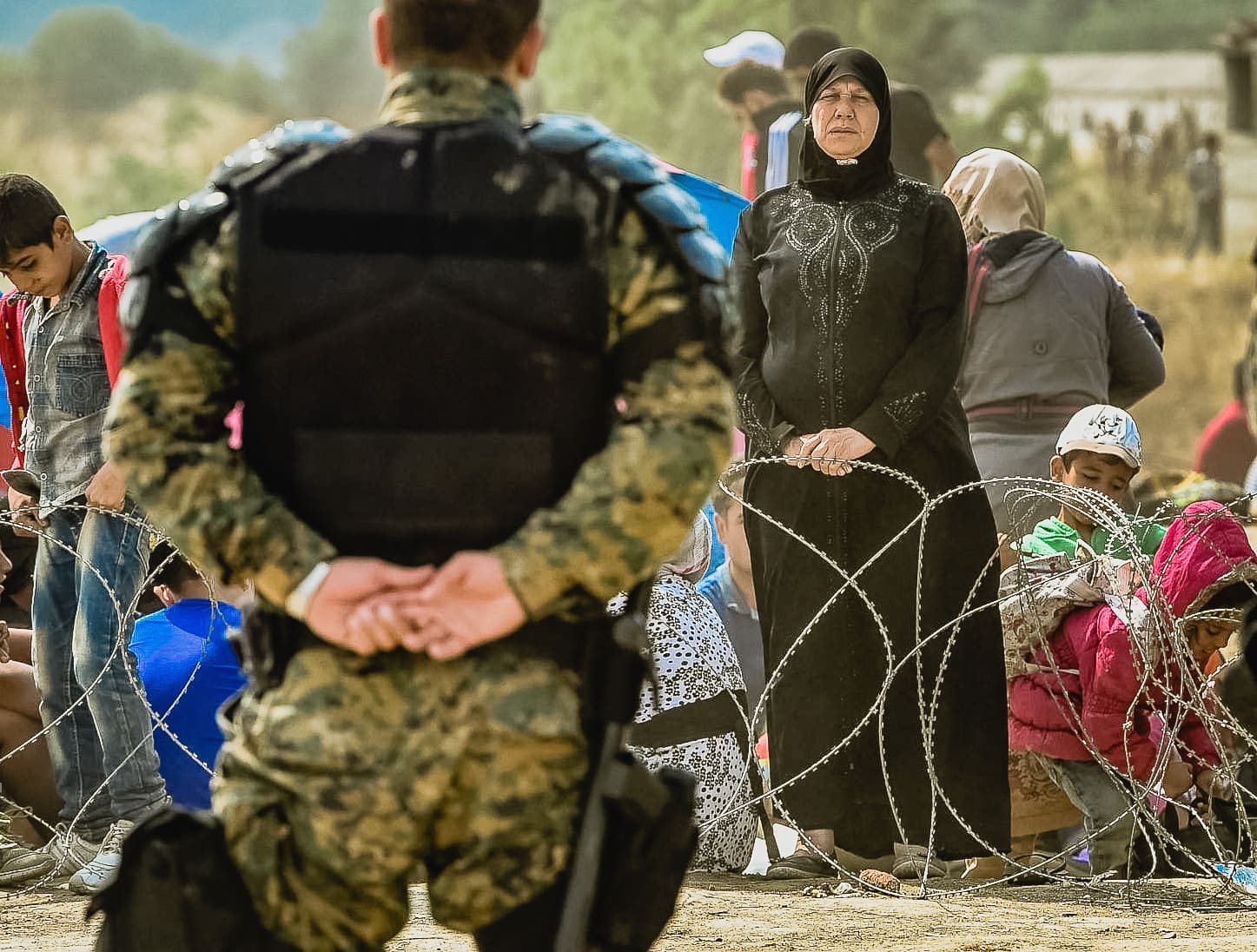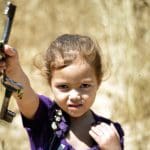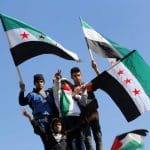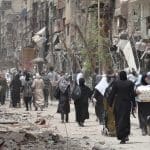
Executive Summary
As attention turns to Israel’s crackdown on the Palestinians under its occupation and amongst its own citizens, Palestinian refugees from Syria remain denied rights granted to other refugees. Al-Shabaka analysts Abu Moghli, Bitarie and Gabiam review the discriminatory legal framework and identify practical steps that could ensure these refugees’ safety and respect their human rights.
Key Points
- Palestinian refugees from Syria are stateless, and amongst the most vulnerable, convincing an increasing number to seek safety in Europe. The legal framework that is being applied to the Palestinian refugees from Syria is a discriminatory one.
- The duty to protect refugees is enshrined in a broader human rights framework and international legal instruments; the principle of non-refoulement (no forced return to the country of origin) is binding on all States as a rule of customary law.
- The international community should facilitate resettlement in third countries, UNRWA should ensure that all Palestinians outside its mandate receive UNHCR assistance, Arab states must comply with the international obligation of non-refoulement, and the PLO should intervene on behalf of Syria’s Palestinians. The Israeli government’s continued denial of the right of return of Palestinian refugees is a major factor in their current vulnerability.
Attacks and Prolonged Siege for Refugees Still in Syria
Palestinian refugee camps in Syria have suffered significant shelling, destruction, and the massive displacement of their populations as a result of the ongoing conflict. No aid has been allowed into Yarmouk for months, and the United Nations Relief and Works Agency for Palestine Refugees (UNRWA) has not been able to distribute food aid to Yalda, Babilla and Beit Saham since June.
The majority of Palestinian refugees who fled Syria (at least 15 percent of Syria’s pre-war Palestinian population) are in neighboring Middle Eastern countries, and many do not have a legal status and are denied basic social services. They face restricted freedom of movement and live in constant fear of arrest and forced return to Syria.
Palestinian Refugee Rights Denied in Jordan, Lebanon, and Egypt
In January 2013, the Jordanian government announced a non-entry policy for Palestinian refugees. Palestinians who fled to Jordan cannot legally live in the refugee camps established for Syrians, nor legally work to earn money to rent other housing.
As of May 2014, Syria-registered Palestinian refugees could only enter Lebanon if they had documents for travel to a third country, limiting their stay to a maximum of nine hours. Restrictions on the ability of Palestinians from Syria to legally renew residency papers put the majority under the threat of arrest and deportation to Syria.
In Egypt, there is currently no UN agency responsible for the protection and assistance of Palestinian refugees in Egypt. Palestinians (unlike other refugees in Egypt) cannot register with UNHCR, and thus cannot get residency permits, receive food vouchers, medical assistance, or any other UNHCR services. Palestinians fleeing Syria for Egypt have been subjected to arbitrary arrest, prolonged detention or deportation, and collective expulsion.
Turkey and Europe: Harsh Conditions and Deadly Risks
The Turkish government reportedly has an open door policy for refugees. Yet there are reports of Turkish border guards pushing back or shooting refugees from Syria trying to enter the country, and of Palestinian refugees being assaulted by border guards. UNHCR services, which are distributed through the Turkish government, are not reaching Palestinian refugees. Given the harsh realities affecting Palestinian refugees, an increasing number are opting to continue on to Europe on clandestine journeys filled with uncertainty and danger.
A Separate and Unequal Legal Status
Palestinian refugees maintain a separate legal status from other categories of refugees, enforced through an exclusion clause in article 1(D) of the 1951 UN Convention Relating to the Status of Refugees. However, if interpreted correctly, Palestinians who are outside of UNRWA’s areas of operation or unable to access UNRWA assistance fall under the mandate of UNHCR.
The exclusion of Palestinian refugees from UNHCR’s mandate was pushed by Arab states who feared that absorbing Palestinians with other categories of refugees would harm the right of return for Palestinians. However, this separate legal status is part of the reason Palestinians fleeing Syria have seen their mobility and access to international protection curtailed. Neither local integration in the country of residence nor resettlement in a third country negates Palestinians’ individual right of return to their homeland.
Recommendations: Protecting the Palestinian Refugees from Syria
- The office of the UN Secretary General should immediately reinstate Yarmouk on the list of places under siege in Syria. The international community should facilitate resettlement in third countries as a solution for Palestinian refugees from Syria.
- Palestinians fleeing the war in Syria to places outside of UNRWA’s area of operation should automatically come under UNHCR’s attention and mandate.
- States who are signatories of the 1965 Casablanca Protocol and other international human rights conventions need to abide by those legal instruments and provide Palestinian refugees with recognized rights and protection.
- The PLO, as the sole representative of the Palestinian people, has a responsibility to intervene on behalf of Syria’s Palestinians and contribute to ensuring their protection and finding solutions to their plight.
- The international community must put pressure on the Israeli government to implement UN resolution 194 which recognizes the right of return of Palestinian refugees and hold it accountable for not abiding by international law.
Overview
The Syrian war that followed the popular uprisings almost five years ago has had a devastating toll on the country’s population. The civilian death toll has reached 200,000, more that half of Syria’s inhabitants have been forced to leave their homes, and human rights violations and abuses are widespread. The Palestinian refugees from Syria are amongst the most vulnerable because they are stateless and have been denied rights granted to other refugees, including in Jordan, Lebanon, Egypt, and Turkey. Indeed, the precarious legal status and social vulnerability of the Palestinian refugees that have fled to other Middle Eastern countries are convincing an increasing number to seek safety and stability in Europe.
Al-Shabaka policy analysts Mai Abu Moghli, 24508, and Nell Gabiam analyze the effects of the war in Syria on Palestinian refugees through a succinct, country-by-country analysis of the legal and social obstacles they face. They examine the discriminatory legal framework that is being applied to the Palestinian refugees from Syria by Arab countries as well as by the international community, and underscore that the Israeli government’s denial of the right of return of Palestinian refugees – in violation of international law – is a major factor in the current vulnerability of the Palestinians of Syria.1
In their policy recommendations, Abu Moghli, Bitarie, and Gabiam identify several practical, immediate steps that Israel, the Palestine Liberation Organization (PLO) and the Palestinian Authority (PA), the United Nations, and the international community should take to address the immediate safety of Syria’s Palestinian refugees and to ensure that their human rights are respected and that they are able to find protection from the Syrian war’s devastating effects.
Attacks and Prolonged Siege for Refugees Still in Syria
Similarly to their Syrian counterparts, Palestinians in Syria have been severely affected by the ongoing war. Syrian towns and villages, as well as Palestinian refugee camps, have been subject to repeated attacks and prolonged sieges by troops loyal to the Assad regime and by Syrian rebels. Palestinian refugee camps, such as Ein el Tal, Dera‘a, al-Husseyniyeh, Sbeineh, Khan El Sheih, and Yarmouk, have suffered significant shelling, destruction, and the massive displacement of their populations as a result of the ongoing conflict.2 Khan al-Shieh, a Palestinian refugee camp located in the Western Ghouta area of Damascus, experienced massive shelling and destruction and has been cut off from Damascus by a government-imposed siege since June 2015.
Yarmouk is in the third year of a siege that, according to Amnesty International, “has been particularly prolonged, has had the harshest impact [on civilians], and has caused the largest number of deaths from starvation”.3 And yet, at the end of July 2015, the office of the UN Secretary General made the surprising decision to remove Yarmouk from the list of besieged areas in Syria, based on the advice of the UN Organization for the Coordination of Humanitarian Affairs (UNOCHA), which argued that humanitarian aid had reached Yarmouk civilians who had crossed into the surrounding areas of Yalda, Babilla, and Beit Sahem. This decision is puzzling, to say the least, given that the situation on the ground is consistent with UNOCHA’s own definition of a besieged place.
Indeed, no aid has been allowed into Yarmouk for months, and the United Nations Relief and Works Agency for Palestine Refugees (UNRWA) has not been able to distribute food aid to Yalda, Babilla and Beit Saham since access to the area was suspended on June 8, although it has recently been able to provide some health services.4 Regular interruptions in water and food supplies continue to affect Yarmouk, Yalda, Babilla and Beit Saham; and while movement between Yalda and Yarmouk is possible, going from one area to the other remains a dangerous undertaking and individuals attempting to cross between the two areas do so at the whim of the government forces and other armed groups operating in the area. It must also be noted that Yarmouk’s surrounding rebel-held areas are themselves encircled by Syrian regime troops, preventing Palestinians from Yarmouk from moving beyond those areas.5
The known Palestinian casualties include 2,663 killed since the beginning of the war in Syria, while 753 Palestinians are being detained and 300 were missing as of February 2015. The majority of detainees are in Syrian government prisons, but others were arrested by armed groups fighting the Assad regime. More than 50 percent of Syria’s pre-war Palestinian population are internally displaced and at least 15 percent have fled across Syria’s borders. The majority of Palestinian refugees who fled Syria are in neighboring Middle Eastern countries. As will be discussed below, many of them do not have a legal status and are denied basic social services. They also have restricted freedom of movement and live in constant fear of arrest and forced return to Syria.
Palestinian Refugee Rights Denied in Jordan, Lebanon, and Egypt
In January 2013, the Jordanian government announced a non-entry policy for Palestinian refugees. Since then, those Palestinians who had been able to cross into Jordan (usually relying on forged documents or smugglers) have lived in fear of being arrested and deported back to Syria.6 Furthermore, Palestinians who fled to Jordan cannot legally live in the refugee camps established for Syrians, but at the same time, cannot legally work to earn money to rent housing outside of camps. The one exception is Cyber City, which is more of a detention center than a refugee camp, and where Jordanian authorities have been transferring Palestinians who are in the country clandestinely since April 2012. Palestinians are confined to Cyber City unless they decide to return to Syria.
As for Lebanon, the authorities began requiring as of the end of 2013 that Palestinians from Syria apply for a visa before entering the country. And as of May 2014, Lebanese authorities were only allowing Syria-registered Palestinian refugees entry into the country if they had the documents needed to travel to a third country, limiting their stay in Lebanon to a maximum of nine hours. In May 2014, restrictions were placed on the ability of Palestinians from Syria to legally renew their residency papers. As a result, the majority of Palestinians from Syria who are currently in Lebanon live under the threat of arrest and deportation to Syria.
In Egypt, the government does not allow Palestinian refugees to register with the office of the United Nations High Commissioner for Refugees (UNHCR). At the same time, Egypt falls outside of the area of operation of the UNRWA. Consequently, there is currently no UN agency responsible for the protection and assistance of Palestinian refugees in Egypt. Additionally, it has become all but impossible for Palestinians from Syria to get visas to Egypt. Because Palestinians (unlike other refugees in Egypt) cannot register with UNHCR, they cannot get residency permits, receive food vouchers, medical assistance, or any other services provided by UNHCR. Palestinians can currently apply for a one-month visa to travel to Egypt, but they also need to get clearance from Egyptian security services, a clearance that is rarely granted. Palestinians fleeing Syria for Egypt have been subjected to arbitrary arrest, prolonged detention or deportation to a third country, and collective expulsion by Egyptian authorities.
Turkey and Europe: Harsh Conditions and Deadly Risks
The Turkish government’s behavior toward refugees on its soil is reportedly characterized by an open door policy; by the principle of non-refoulement (no forced return to the country of origin); and by unlimited duration of stay in Turkey. However, the Turkish commitment to implementation of this policy is undermined by reports of Turkish border guards pushing back or shooting refugees from Syria trying to cross the Turkish border, and of Palestinian refugees being assaulted by border guards while attempting to cross into Turkey. The situation of Palestinians from Syria who are already inside Turkey is also far from ideal: Because Turkey is not part of UNRWA’s area of operations, Palestinians in Turkey do not have access to the agency’s assistance. Normally, these Palestinians would fall under UNHCR’s mandate. However, UNHCR services, which are distributed through the Turkish government, are not reaching Palestinian refugees, whose legal status in Turkey remains unclear. Part of the problem is that the Turkish government does not allow UNHCR to perform refugee status determination on its soil.
Given the harsh realities affecting Palestinian refugees in Syria and in neighboring countries, an increasing number are opting to continue on to Europe. Since it is impossible for Palestinians to get a visa to Europe from one of the Middle Eastern host countries, their only option is to go to Europe clandestinely. These clandestine journeys sometimes require those who take them to sacrifice their life savings and are filled with uncertainty and danger: The danger of being abandoned by smugglers before reaching their destination; of being cheated out of their money by smugglers without making it to Europe;7 of being shot at, arrested or detained by the authorities at points of departure; of being arrested, detained and even tortured along the way or upon arrival by European authorities; or of drowning during the crossing of the Mediterranean.
A Separate and Unequal Legal Status
Palestinian refugees maintain a separate legal status from other categories of refugees. This separate status is enforced through an exclusion clause in article 1(D) of the 1951 UN Convention Relating to the Status of Refugees that states that the convention does not apply to persons who are already being assisted by another UN organ or agency. At the time of the signing of the 1951 convention, Palestinian refugees were already receiving services from UNRWA and the UN Conciliation Commission for Palestine and were thus excluded from UNHCR’s mandate. However, if interpreted correctly, article 1 (D) also means that Palestinians who are located outside of UNRWA’s normal areas of operation or who are unable to access UNRWA assistance immediately fall under the mandate of UNHCR.
It is worth recalling that the exclusion of Palestinian refugees from UNHCR’s mandate was pushed by Arab states, who feared that absorbing Palestinians with other categories of refugees would harm the right of return as a primary solution for Palestinians who were expelled or fled from their homes in 1948. However, as has been noted in Badil’s publication Al-Majdal, this exclusion has also contributed to the “construction of a separate and unique category of ‘Palestine’ refugees and therewith created an environment in which discriminatory policies can flourish”. Indeed, it is clear from the examples above that Palestinians fleeing the conflict have seen their mobility and access to international protection curtailed in part because of their Palestinian identity and separate legal status.
Furthermore, Arab states often justify their discriminatory policies against Palestinians in the name of protecting the Palestinian right of return. In an interview with the newspaper al-Hayat, Jordan’s prime minister Abdalah Ensour justified Jordan’s restrictive policies toward Palestinians fleeing Syria by explaining that allowing Palestinians from Syria into Jordan would absolve Israel of its responsibility toward Palestinian refugees. He ended his explanation by saying that “Our Palestinian Brothers have the right to return to their country of origin. They should stay in Syria until the end of the crisis”. Similarly, the Lebanese government has generally justified its denial of basic rights (such as the right to work or to own property) to Palestinians on its soil as a form of support for the Palestinian right of return that is predicated on the non-integration of Palestinians into Lebanese society. The current hardships faced by Palestinians from Syria who are in Lebanon or those trying to reach Lebanon cannot be divorced from Lebanon’s pre-existing policies toward Palestinians on its soil.
Even with their exclusion from the 1951 Convention, Palestinian refugees are entitled to the protection of other legal instruments. Uniform and consistent application of the Protocol relating to the Treatment of Palestinians in Arab States, adopted at Casablanca on 11 September 1965 by Arab countries would alleviate some of the obstacles and hardships that Palestinians from Syria are facing in the neighboring countries to which they fled. Furthermore, the duty to protect refugees is enshrined in a broader human rights framework that includes instruments such as the Convention Against Torture and other Cruel, Inhuman, or Degrading Punishment, the Convention on the Rights of the Child, and the International Covenant on Civil and Political Rights. It is also worth noting that the principle of non-refoulement is considered a rule of customary international law. As such it is binding on all States, regardless of their accession to the 1951 Convention. Even when new host countries for Palestinian refugees from Syria are not signatories to the 1951 Convention, or have reservations about applying the Convention to Palestinians, the rights of Palestinian refugees, particularly non-refoulement, should be implemented under international human rights law.8
Recommendations: Protecting the Palestinian Refugees from Syria
As noted above, there are immediate and practical steps as well as longer term measures that can be taken by Israel, the international community, the PLO and the PA, the Arab countries, and Turkey in order to address the rights of the Palestinian refugees from Syria.
The UN and the International Community
1. The office of the UN Secretary General should immediately reinstate Yarmouk on the list of places under siege in Syria.
2. The international community, especially European countries and countries taking part in the Syrian conflict, should facilitate resettlement in third countries as a solution for Palestinians fleeing Syria. In light of the violence and instability that Palestinians are facing in Syria as well as other parts of the Middle East and the discrimination they are experiencing in Syria’s neighboring countries, immigration to Europe has become a matter of survival.
As of July 2015, only 6 percent of all refugees fleeing the Syrian conflict arrived in Europe seeking international protection. European countries have the resources to accommodate a much larger number, especially in comparison to countries like Lebanon, Jordan, and Turkey where the majority of the refugees from the Syrian war are currently based.
It would be wrong to criticize the resettlement of Palestinians from Syria to third countries in terms of its effect on the right of return. Doing so would be no different than Arab states using support for the right of return to deny basic human rights to Palestinians on their territory. Neither local integration in the country of residence nor resettlement in a third country negates Palestinians’ individual right of return to their homeland.
Because resettlement to third countries is not part of UNRWA’s mandate, UNHCR as well as the governments of particular states could step in to facilitate the resettlement of Palestinian refugees fleeing the atrocities in Syria to third countries. The option of resettlement for Palestinian refugees in emergency situations has been implemented before. Following the US invasion of Iraq and the violence that ensued, UNHCR advocated for the resettlement of Palestinians living in camps along Iraq’s border with Syria. By 2010, the agency had facilitated the resettlement of approximately one thousand Palestinians to third countries such as Iceland, Chile, Sweden, Brazil Canada, and the United States.
3. Palestinian refugees should not continue to fall through the cracks of the international protection regime. Palestinians fleeing the war in Syria to places outside of UNRWA’s area of operation should automatically come under UNHCR’s attention and mandate: the international community should pressure the Egyptian government to abide by international law and allow Palestinian refugees on its soil to have access to UNHCR’s services and protection. It should also make sure that Turkey is providing the same services and protection to all refugees on its soil and that Palestinians are not excluded from these services and protection (including those that emanate from the UNHCR).
UNRWA is currently working with Egyptian authorities, the PLO representative and other UN agencies (including UNHCR and the World Food Programme) to assist Palestine refugees from Syria who are now in Egypt.9 The agency should engage in similar action with regard to Palestinian refugees in Turkey. It should pressure the Turkish government to ensure that Palestinian refugees from the Syrian conflict who are in Turkey are receiving UNHCR assistance as well as other assistance and protection generally provided by the Turkish government to refugees who have fled Syria. In line with its protection mandate, UNRWA should make sure that advocacy for the respect of Palestinian refugee’s human rights is part of its efforts on behalf of Palestinians who have fled Syria for neighboring countries.
4. It is more than ever crucial for the international community to step up its funding of UNRWA. In August 2015, UNRWA, which was facing a budget deficit of $101 million at the time, issued an emergency appeal to the international community fearing it would not be able to guarantee education to half a million Palestinian refugees across the Middle East for the upcoming school year. Financial threats to the continuation of UNRWA’s basic services undermine the agency’s effectiveness in other parts of its mandate, specifically its protection role vis-à-vis Palestinian refugees inside and outside UNRWA’s area of operation. This role is sorely needed and needs to be strengthened at a time when tens of thousands of Palestinians fleeing violence are not being treated in accordance with the stipulations of human rights law, international humanitarian law and international refugee law.
5. The Israeli government bears the ultimate responsibility for the current plight of Palestinian refugees in and from Syria, given its denial of the right of return of Palestinian refugees to their homes, a denial that, as noted above, violates international law. The international community must put pressure on the Israeli government to implement UN resolution 194 which recognizes the right of return of Palestinian refugees and hold it accountable for not abiding by international law.
The Arab States, the PLO, and the PA
1. Arab host states need to stop using the right of return as an excuse to deny basic rights to Palestinian refugees and must comply with the international obligation of non-refoulement. States who are signatories of the 1965 Casablanca Protocol (all states have signed it except for Saudi Arabia, Tunisia, and Morocco), and of other international human rights conventions need to abide by those legal instruments and provide Palestinian refugees with the rights and protection recognized in those instruments.
2. The PA and the PLO have officially taken a position of neutrality since the beginning of the conflict in Syria. However, not taking sides in the conflict should not become a substitute for inaction in the face of the insecurity and suffering that have befallen Syria’s Palestinians as a result of the unfolding conflict. A direct effect of this insecurity and suffering is the increasing fragmentation and scattering of Syria’s Palestinian refugee community, as refugees are forced to seek safety further and further afield. The PLO, especially, as the sole representative of the Palestinian people, has a responsibility to intervene on behalf of Syria’s Palestinians and contribute to ensuring their protection and finding solutions to their plight. Palestinian President Mahmoud Abbas has called for the Israeli government to allow Palestinian refugees from Syria to find sanctuary in the Occupied Palestinian Territories and has recently called for the international community to pressure the Israeli government on this issue. However, the PA and PLO should do more.
a. The PA and PLO should focus their efforts on negotiations with the Syrian government in view of ending the sieges in the camps of Yarmouk and Khan el Shieh, ending the suffering of Palestinians who remain in the country such as those incarcerated in the prisons of the regime, and finding a safe passage for the remaining civilians who have been trapped in Yarmouk for nearly three years now.
b. While continuing to defend the right of return of Palestinian refugees, the PA and PLO should pressure the governing authorities of third countries to keep their borders open to Palestinians fleeing to those countries and to treat Palestinians on their soil in accordance with international law.
c. The PLO and PA should work towards the release of Palestinian Syrians unlawfully detained in transit countries.
- For more information on Israel’s violation of Palestinian rights, see Takkenberg, Lex 1998 The Status of Palestinian Refugees in International Law. Oxford: Clarendon Press.
- In addition to the sources hyperlinked, this information is based on author interviews with Palestinians who fled Ein el Tal, April 2015
- The Syrian government’s siege of Yarmouk began in December 2012 (Amnesty International 2014a). However, as the conflict intensified, the involvement of Palestinian factions and Syrian rebels became prominent and Yarmouk’s residents have been caught in a three-way conflict between the Islamic State, the Syrian government and Palestinian fighters (SREO 2015).
- Interview with representatives of UNRWA, July 30, 2015.
- Some of the material in this paragraph is based on interviews and email exchanges with aid organizations, including UNRWA.
- Interview with UNRWA employee, Amman, Jordan, March 2015. In addition, an August 2014 report by Human Rights Watch notes that over 100 Palestinian refugees have been detained and deported back to Syria by Jordanian authorities since the beginning of 2013.
- Interviews with Palestinians in France and Sweden, May-June 2015
- Only Turkey and Egypt are parties to the 1951 Convention. Jordan, Lebanon, Egypt and Turkey are parties to the Convention against Torture and Other Cruel, Inhuman or Degrading Treatment or Punishment. Jordan, Lebanon, Egypt and Turkey are parties to the Convention on the Rights of the Child. Jordan, Lebanon, Egypt and Turkey are parties to the International Covenant on Civil and Political Rights.
- Interview with UNRWA representatives, July 30, 2015.















